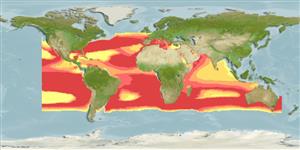Teleostei (teleosts) >
Lampriformes (Velifers, tube-eyes and ribbonfishes) >
Lophotidae (Crestfishes)
Etymology: Lophotus: Greek, lophos = crest (Ref. 45335).
Eponymy: Bernard Germaine Etienne de la Ville, Comte de Lacépède (also spelled La Cepède) (1756– 1825), was a French naturalist and politician. [...] (Ref. 128868), visit book page.
Issue
Species spelling Eschmeyer, pers. comm.
Environment: milieu / climate zone / depth range / distribution range
Ecology
Marine; bathypelagic; oceanodromous (Ref. 51243); depth range 0 - 92 m (Ref. 36608). Deep-water; 51°N - 45°S, 130°W - 158°E
Nearly worldwide in warmer seas. Western Atlantic: Florida in USA to Brazil (Ref. 7251). Eastern Atlantic: western Mediterranean, off Portugal, Madeira and off Canary Islands; also South Africa (Ref. 4165). Western Indian Ocean: recently recorded from Reunion (Ref. 53568). Eastern Pacific: southern California, USA (Ref. 6740). Also reported from Australia (Ref. 9563).
Size / Weight / Age
Maturity: Lm ? range ? - ? cm
Max length : 200 cm TL male/unsexed; (Ref. 4165); common length : 100.0 cm TL male/unsexed; (Ref. 3397)
A rare (Ref. 4165), oceanic, mesopelagic species. Occasionally stranded in shallow water (Ref. 9563). Capable of discharging a black ink from an ink-sac in the cloaca when alarmed. Adults feed on fishes (anchovies) and squids (Ref. 6740). Oviparous, with planktonic eggs and larvae (Ref. 36608). Found in stomachs of tunas (Ref. 2850).
Life cycle and mating behavior
Maturity | Reproduction | Spawning | Eggs | Fecundity | Larvae
Palmer, G., 1986. Lophotidae. p. 734-735. In P.J.P. Whitehead, M.-L. Bauchot, J.-C. Hureau, J. Nielsen and E. Tortonese (eds.) Fishes of the north-eastern Atlantic and the Mediterranean. UNESCO, Paris. Vol. 2. (Ref. 6740)
IUCN Red List Status (Ref. 130435: Version 2024-1)
Threat to humans
Harmless
Human uses
Fisheries: of no interest
Tools
Special reports
Download XML
Internet sources
Estimates based on models
Preferred temperature (Ref.
123201): 15.2 - 26.9, mean 22.1 °C (based on 1116 cells).
Phylogenetic diversity index (Ref.
82804): PD
50 = 0.6875 [Uniqueness, from 0.5 = low to 2.0 = high].
Bayesian length-weight: a=0.00389 (0.00180 - 0.00842), b=3.12 (2.94 - 3.30), in cm total length, based on all LWR estimates for this body shape (Ref.
93245).
Trophic level (Ref.
69278): 4.5 ±0.67 se; based on food items.
Fishing Vulnerability (Ref.
59153): Very high vulnerability (90 of 100).
